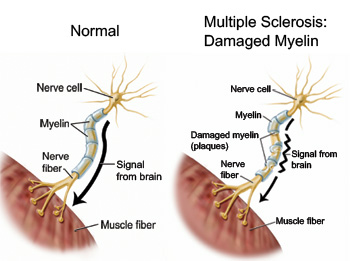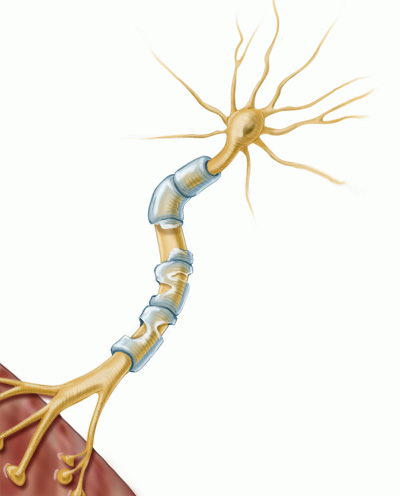If you were asleep for the past decade and a half, you would surely be surprised to wake up in the world of iPods, smart cellular phones, and Global Positioning Systems. What we know about multiple sclerosis (MS) has changed about as much as consumer electronics in that same time frame.
“It’s a fascinating time in MS research,” says Patricia O’Looney, Ph.D., vice president of biomedical research at the National Multiple Sclerosis Society. “The knowledge is so great now.”
Multiple sclerosis is an unpredictable and often disabling disease of the central nervous system. It is believed to be an autoimmune disease, which means that the immune system reacts against itself. One of its quirks is that its progress, severity, and symptoms are different in everybody.
An estimated 400,000 people in the United States are affected by MS. Someone is diagnosed with MS every hour, every day of the year.
Symptoms that might send someone to a neurologist for tests include: loss of mobility; numbness, tingling, or pain; and sudden, often temporary, blindness. People may have mysterious, erratic symptoms for years before diagnosis. Most people — two to four times as many women as men — are diagnosed between ages 20 and 50.
Not surprisingly, genetics plays a major role in current research. “So far, researchers have found as many as 12 genes (out of about 20,000 in the human genome) that are linked to MS. Most of these are connected to the regulation of the immune system, which is inherited from our parents. In the end, we may find as many as 80 MS genes,” says Dr. O’Looney. “Identifying these genetic markers will help us understand why there’s such variability and unpredictability in the disease. There might even be some genes linked to particular types of MS. When you identify genes, it may lead to targets for new therapies.”

Image © 2009 RelayHealth and/or its affiliates
Being able to predict the course of disease might mean being able to tailor treatment to each patient. But finding these genes (80 out of 20,000) is like looking for a needle in a haystack. The best way to find the needle is to look at a large number of samples from people. To that end, researchers here and in the U.K. are collecting and studying blood samples from MS patients and their family members.
Even with genetic susceptibility, something has to trigger the disease, and researchers are looking for these catalysts. One hypothesis is that a lack of sunlight and vitamin D — which, in part, regulates the immune system — might play that role. One bit of evidence is a higher prevalence of MS the farther you live from the equator in your early years. What complicates this research is that there may be different triggers in different people. If a virus is the culprit, as many suspect, it likely has vanished from the body years before the onset of symptoms.
With more than 130 clinical trials under way around the world, including more than a dozen phase 3 (late-stage) trials in process, nearing completion, or finished, MS research is making huge strides toward solving these unknowns. Many of these trials focus on treatment. The vast majority of people with MS have a type called relapsing-remitting and take one of the FDA-approved disease-modifying therapies. Fifteen years of data demonstrate their effectiveness. “What research has told us is that the disease is much more active than originally thought,” Dr. O’Looney explains. “Even if a person is aware of one or two flareups a year, the disease could still be active, although asymptomatic, particularly in the brain. There are times when a person feels OK, but damage is taking place. That’s why the National MS Society advocates so strongly that people diagnosed with MS should be on drug therapy.” Not everyone responds the same to these medications, so having several to choose among is important. One option we can expect to see within a year or so is an oral medication, which may be offered alongside or as a replacement for the injectable medications.
Another promising line of inquiry is understanding how sex hormones may regulate the immune system in people with MS. For example, levels of the hormone estriol typically rise significantly during late pregnancy. This is also when most women’s MS activity declines, leading some scientists to suspect that estriol may be responsible for the easing of symptoms during pregnancy. Preliminary results in a small pilot trial showed that oral estriol treatment decreased disease activity in women with relapsing-remitting MS. To further explore this, a larger trial has begun at the University of California at Los Angeles and several sites throughout the United States.
“Five or 10 years from now, it is certainly our hope that more and increasingly effective MS therapies will be available,” Dr. O’Looney concludes. “Our goal is to find a cure for everyone, and we will, eventually.”
To learn more, call 800-344-4867 or visit www.nationalmssociety.org.
Terri Garr

Teri Garr is probably best known for her Oscar-nominated role in Tootsie. These days she has an equally compelling role as an advocate for people with MS. She’s also working on a sequel to her autobiography, Speedbumps.
Garr takes one of the MS disease-modifying therapies, which has slowed the progression, she says. She also exercises for an hour a day on a recumbent bicycle. “It helps strengthen both my arms and legs and is aerobic as well. Plus, I can read or watch TV while I’m on it. In the summer, I swim, which I really love. It’s vital to keep moving.” She eats healthy, balanced meals and “was blessed with a dancer’s metabolism. I eat pretty much what I like, but in moderation.
“I decided to go public with my diagnosis partly because rumors had begun circulating about my health, and I wanted to be the one to set the record straight. Besides, what’s worse? Being disabled or being a woman over 50 in Hollywood? Once I went public about my MS, I quickly realized that I would be able to help people in the same condition, and there was nothing to be ashamed of. If people could relate to me through my work, why not in my real life? I became a spokesperson for MS Lifelines, a patient education program, and traveled the country speaking to people with MS, trying to encourage them to find out everything they could about the available therapies and how they could move forward with their lives. I still receive e-mails and fan letters that thank me for sharing my story and helping take the stigma and mystery away from MS.
“The most important thing I tell people with MS is to have a positive mental attitude and keep moving! I also advise anyone
recently diagnosed to relax. The status of MS research has never been more exciting. People talk about the ‘war’ against MS; this isn’t a war, but a movement by and for people with MS.
“Together we will create a world free of multiple sclerosis.”
Montel Williams

MS is heinous. All of us suffer,” says Montel Williams, Emmy Award-winning talk show host, author, decorated naval officer, and philanthropist. He has also been, since 1999, a public face of multiple sclerosis.
Without a trace of self-pity, Williams admits he has 24-hour pain in his feet and side, and that it has recently migrated to his face. He’s tried many remedies, from over-the-counter painkillers to opiates, and from acupuncture to biofeedback. He deals with his condition by raising awareness and funds for MS research through the Montel Williams MS Foundation. “MS is a lifelong battle. There’s no wonder drug that arrests it with true efficacy,” he says. “We’re in a battle of time.” He also actively supports the Partnership for Prescription Assistance (pparx.org), which matches patients with free or nearly free prescriptions.
“The most important thing you can do as a patient, no matter the illness, is educate yourself,” he adds. “There is nothing more profoundly assuring and calming than knowledge.”
Become a Saturday Evening Post member and enjoy unlimited access. Subscribe now




Comments
I had the CCSVI procedure about a year ago and honestly, I feel worse today than I did prior to the procedure.coincidence? maybe,but I wouldn’t recommend it to anyone.
I’ve had ms for about 5 years now,but seems like 20:(
Why are all of the stories about drugs? The most promising news in MS treatment options is angioplasty to treat Chronic Cerebro-Spinal Venous Insufficiency. It won’t cure MS, but it does oftern relieve many MS symptoms, and may in fact slow or even halt progression of the disease. Why does this not even deserve a mention in this story?
I hate to have to agree with Jesuit at least to some exstent… I have had MS for 18 years and have just recently been truly had debilitating results. I give the medications that or RX by my PCP and they are denied because they want more and more not only costly but dangerous test done. I am denied short term disablity over and over because they want more and more info. What more information does a company need than what the PCP’s are giving. Why are insurance companies not onboard with current research and what Dr’s are RXing.. It’s frustrating and hurtful both in the body and mind…. Why can’t everyone just be on the same page with MS and allow the MANY MANY different people get the desired help they need???
The endless pursuit of abstract understanding goes on; lucrative research studies proliferate. Efforts to control, to manage, to treat symptoms, predominate. “Approved” therapies are examined and re-examined.
Cures are not truly sought because, apparently, orthodox medicine does not believe they exist.
Sound outrageous? Name a few actual cures these white-coated elitists have come up with.